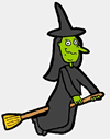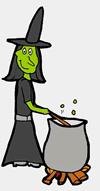



|

|
|
 Everything Redhead

The authorities joined the inquisition around 1390, when these cases were brought before the courts.
The death penalty was imposed with much regularity from the mid-15th century. Between 1428-1450 no fewer than 110 women and 57 men were burned alive as witches in Briancon, Dauphine. More died in Toulouse in 1557 when forty were put to death and at Poitiers in 1568 whe four died.
Arras witch-hunts were carried out by the inquisition under the confessions of several witches who had been named and who also named other witches whil they were tortured.
Those charged and found guilty under the inquisition were paraded in the streets in the hereitc garb and then burned alive. Also many others who were rounded up were tricked into confessions under teh promise of if they cooperated they would be allowed to go free. They were forced to set free those who had been held as witches and those who had survived were told to pray for those whose lives had been taken.
Cideville had their own trials such as that of a Felix Thorel who had been recruited by a white witch who had been arrested for practising medicine without a license. Thorel then set about exacting revenge on the cure who had fallen out with him by using his so-called powers as a witch to create unearthly happenings.
He was tried but it was not proven so he was allowed to go free.
Luxeuil also had a notable trial that of Madame Desle la Mansenee who was tried as a witch at the instigation of the inquisition. It was a notable trial as it demonstrated the continued influence of the inquisition. The whole case was based on hearsay and gossip that was secretly gathered. Those of her neighbors were alleging that she had caused much of the misfortunes that had occured, she was hanged and her body burned to ashes.
Paris witch trial was a remarkable trial for the care that the Parliament took to apply the law soberly and correctly. The use of torture was, however, sanctioned and thus redered attempts to observe the spirit of the law futile.
The accused woman in the case was a Jehenne de Brigue who was alleged to have used sorcery to heal the seriously ill Jehan de Ruilly, who according the accused was the victim of a spell cast by his lover Gilette. She denied being a witch but did however admit to using charms and neglecting to say her Paternoster. Later she did admit to being a witch and while awaiting to be sentenced she claimed to be pregnant which was later to found not to be true, then it went to appeal at which she was tortured and strapped to the ladder at which she admitted to helping Ruilly's wife kill her husband and then they both were tried and burnt to death.
   
 Halloween
   
 Please read our Legal Statement and Privacy Policy.
|